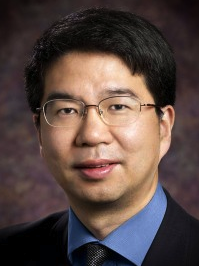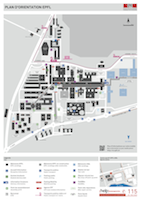Go to
Jason Cong
 Chancellor's Professor
Chancellor's Professor
Director, VLSI Architecture, Synthesis and Technology (VAST) Laboratory
Computer Science Department
University of California, Los Angeles, California, USA
Synthesis for Hardware Acceleration
Friday, 11 December 2015 at 14:00 in room BC 420
Abstract:
Customized computing has been of interest to the research community for over three decades. The interest has intensified in the recent years as the power and energy become a significant limiting factor to the computing industry. For example, the energy consumed by the datacenters of some large internet service providers is well over 109 Kilowatt-hours. FPGA-based acceleration has shown 10-100X performance/energy efficiency over the general-purpose processors in many applications. However, programming FPGAs as a computing device is still a significant challenge. Most of the accelerators are designed using manual RTL coding. The recent progress in high-level synthesis (HLS) has improved the FPGA programming productivity considerably. But extensive source code rewriting is still required to achieve high-performance acceleration, especially for large-scale distributed computation at the datacenter scale.
In this talk, I shall present our ongoing work to enable further automation for customized computing. One effort is on automated compilation to combining source-code level transformation for HLS with efficient parameterized architecture template generations. I shall highlight our progress on polyhedral-based data prefetching, reuse and code generation, memory partitioning, coordinated module selection, duplication, and scheduling with communication optimization. These techniques allow software programmers to easily compile computation kernels to FPGAs for acceleration.
About the speaker:
Jason Cong received his B.S. degree in computer science from Peking University in 1985, his M.S. and Ph. D. degrees in computer science from the University of Illinois at Urbana-Champaign in 1987 and 1990, respectively. Currently, he is a Chancellor’s Professor at the UCLA Computer Science Department, the director of Center for Domain-Specific Computing (CDSC). He served as the department chair from 2005 to 2008. Dr. Cong’s research interests include electronic design automation, energy-efficient computing, customized computing for big-data applications, and highly scalable algorithms. He has over 400 publications in these areas, including 10 best paper awards, and the 2011 ACM/IEEE A. Richard Newton Technical Impact Award in Electric Design Automation. He was elected to be an IEEE Fellow in 2000 and ACM Fellow in 2008. He is the recipient of the 2010 IEEE Circuits and System Society Technical Achievement Award "For seminal contributions to electronic design automation, especially in FPGA synthesis, VLSI interconnect optimization, and physical design automation."
Dr. Cong has graduated 33 PhD students. Nine of them are now faculty members in major research universities, including Cornell, Fudan Univ., Georgia Tech., Peking Univ., Purdue, SUNY Binghamton, UCLA, UIUC, and UT Austin. One of them is now an IEEE Fellow, six of them got the highly competitive NSF Career Award, and one of them received the ACM SIGDA Outstanding Dissertation Award. Dr. Cong has successfully co-founded three companies with his students, including Aplus Design Technologies for FPGA physical synthesis and architecture evaluation (acquired by Magma in 2003, now part of Synopsys), AutoESL Design Technologies for high-level synthesis (acquired by Xilinx in 2011), and Neptune Design Automation for ultra-fast FPGA physical design (acquired by Xilinx in 2013). Currently, he is a co-founder and the chief scientific advisor of Falcon Computing Solutions, a startup dedicated to enabling FPGA-based customized computing in data centers.
Secondary navigation
- EPFL Workshop on Logic Synthesis and Emerging Technologies
- Luca Amaru
- Luca Benini
- Giovanni De Micheli
- Srini Devadas
- Antun Domic
- Rolf Drechsler
- Pierre-Emmanuel Gaillardon
- Jie-Hong Roland Jiang
- Akash Kumar
- Shahar Kvatinsky
- Yusuf Leblebici
- Shin-ichi Minato
- Alan Mishchenko
- Vijaykrishnan Narayanan
- Ian O'Connor
- Andre Inacio Reis
- Martin Roetteler
- Julien Ryckaert
- Mathias Soeken
- Christof Teuscher
- Zhiru Zhang
- Symposium on Emerging Trends in Computing
- Layout synthesis: A golden DA topic
- EPFL Workshop on Logic Synthesis & Verification
- Luca Amaru
- Luca Benini
- Robert Brayton
- Maciej Ciesielski
- Valentina Ciriani
- Jovanka Ciric-Vujkovic
- Jason Cong
- Jordi Cortadella
- Giovanni De Micheli
- Antun Domic
- Rolf Drechsler
- Henri Fraisse
- Paolo Ienne
- Viktor Kuncak
- Enrico Macii
- Igor Markov
- Steven M. Nowick
- Tsutomu Sasao
- Alena Simalatsar
- Leon Stok
- Dirk Stroobandt
- Tiziano Villa
- Symposium on Emerging Trends in Electronics
- Raul Camposano
- Anantha Chandrakasan
- Jo De Boeck
- Gerhard Fettweis
- Steve Furber
- Philippe Magarshack
- Takayasu Sakurai
- Alberto Sangiovanni-Vincentelli
- Ken Shepard
- VENUE
- Panel on Circuits in Emerging Nanotechnologies
- Panel on Emerging Methods of Computing
- Panel on The Role of Universities in the Emerging ICT World
- Panel on Design Challenges Ahead
- Panel on Alternative Use of Silicon
- Nano-Bio Technologies for Lab-on-Chip
- Functionality-Enhanced Devices Workshop
- More Moore: Designing Ultra-Complex System-on-Chips
- Design Technologies for a New Era
- Nanotechnology for Health
- Secure Systems Design
- Surface Treatments and Biochip Sensors
- Security/Privacy of IMDs
- Nanosystem Design and Variability
- Past Events Archive
Presentation Slides
On-line Registration
Registration is now closed. We have reached the maximum number of registrants. We thank you for your interest in our workshop!
Venue
All talks will take place at EPFL room BC 420. Please click HERE to go to the interactive EPFL map.


